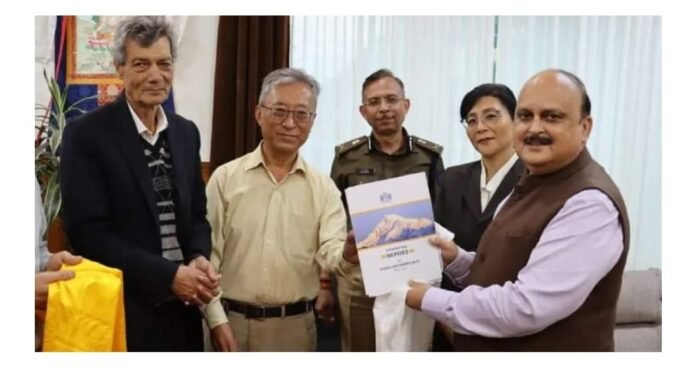In a significant development regarding the Inner Line Permit (ILP) issue, the Sikkim government’s high-level committee has recently submitted its report, shedding light on the applicability of the ILP system within the state.
The committee, tasked with examining the feasibility and potential implementation of the ILP system in Sikkim, diligently analyzed various aspects of the matter. Comprised of renowned experts and stakeholders, the committee’s comprehensive report carries substantial weight in shaping the future course of action on this critical issue.
The ILP system, already in place in certain northeastern states, seeks to regulate the entry of non-residents into protected areas. Its objective is to strike a balance between preserving local culture, tradition, and safeguarding the rights and interests of the indigenous population.
Sikkim, nestled in the majestic Himalayas, boasts unique ethnic diversity and a rich cultural heritage. With growing concerns about preserving the state’s distinct identity and addressing the challenges posed by increasing migration, the government formed the high-level committee to explore the feasibility of implementing the ILP system.
The committee’s report delves into an array of factors, such as the social, economic, and administrative implications of adopting the ILP system. It carefully examines case studies from other states where ILP regulations are already in effect, drawing valuable insights and lessons that can be applied to Sikkim’s specific context.
Additionally, the report takes into account the feedback and opinions of various stakeholders, including local communities, civil society organizations, and experts in the field. This inclusive approach ensures that a broad range of perspectives is considered in the decision-making process.
While the specifics of the committee’s recommendations remain undisclosed, the report is expected to provide a roadmap for the government to consider the potential implementation of the ILP system. It will serve as a crucial reference point for policymakers and legislators as they deliberate on the best way forward.
The submission of the report marks an important milestone in addressing the ILP issue in Sikkim. The government’s commitment to seeking expert advice and conducting a thorough evaluation reflects its dedication to addressing the concerns of its citizens and safeguarding the state’s cultural and demographic fabric.
As the report’s contents become public, it is anticipated that discussions and debates on the applicability of the ILP system in Sikkim will intensify. The report’s findings will undoubtedly shape the trajectory of future policy decisions, aiming to strike a harmonious balance between preserving Sikkim’s unique identity and promoting inclusive growth.
The government is expected to carefully review the report and take into account its recommendations, ensuring that any potential measures are implemented in a fair, transparent, and effective manner. The ultimate goal remains to preserve the essence of Sikkim while embracing progress and development in a manner that benefits both residents and visitors alike.
As stakeholders eagerly await the government’s response to the committee’s report, the ILP issue in Sikkim continues to be a focal point of public discourse, with its resolution holding the potential to shape the state’s trajectory for years to come.
With the submission of the committee’s report, discussions and debates on the applicability of the ILP system in Sikkim are expected to intensify. The report’s findings will shape the trajectory of future policy decisions, aiming to strike a harmonious balance between preserving Sikkim’s unique identity and promoting inclusive growth.
The government is expected to carefully review the report and consider its recommendations. The goal is to ensure that any potential measures are implemented in a fair, transparent, and effective manner. Balancing the concerns of local communities, the preservation of cultural heritage, and the state’s developmental aspirations will be crucial considerations in the government’s response.



